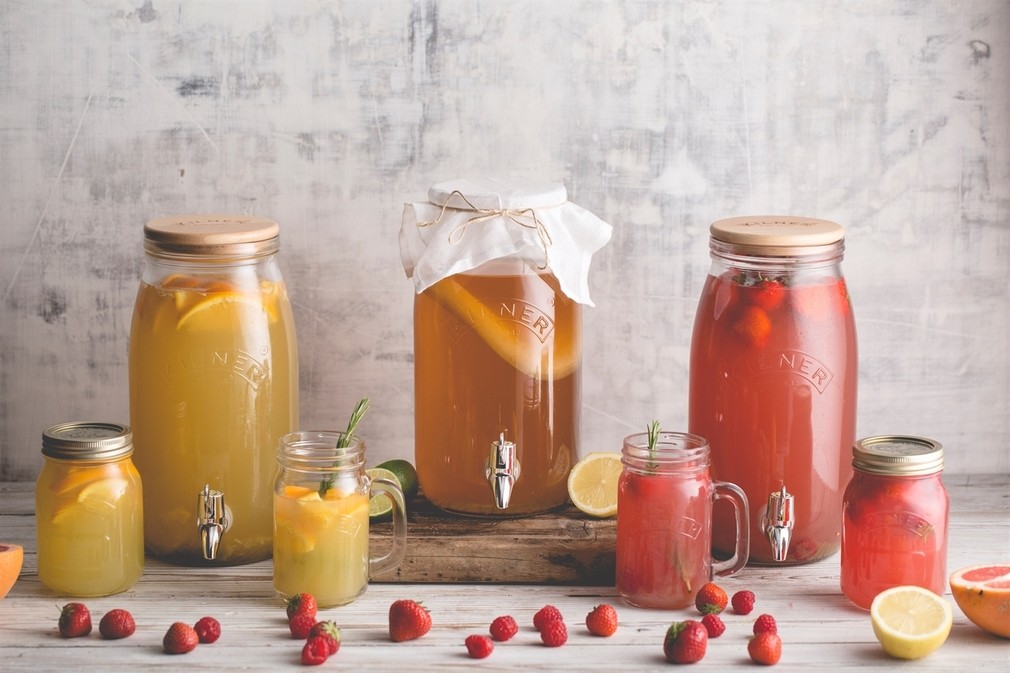You might have heard the word ‘Kombucha’ floating around the health blogs recently and most likely wondered what on earth it is. You are not alone, when our friends over at Kilner told us about a brand new product they’d released called The Kombucha Set we were non the wiser. Kombucha has been called the ‘tea of immortality’ and is being raved about by more and more health blogs and shops, but what is it?
 What is Kombucha?
What is Kombucha?
Kombucha is a sweet fermented tea that can be made from the comfort of your own home. It is a health promoting drink, made by fermenting tea using something called a Kombucha culture which can also be called a SCOBY ( a symbiotic colony of bacteria and yeast). This culture feeds on the sugar in the tea and produces lots of gut-loving bacteria!
You might be thinking ‘But sugar isn’t healthy?’, this was our thought as well. However, although the recipe does call for some sugar, it actually acts as a food for the Scoby, and in turn is up to 90% consumed by the bacteria during fermentation, leaving the Kombucha Tea naturally sweet.
After fermentation, Kombucha becomes carbonated and contains vinegar, B vitamins, enzymes, probiotics and a high concentration of acid (acetic, gluconic and lactic). These bacteria are known as “cellulose-producing bacteria,” meaning they produce cellulose, which acts as a shield to cells!
Kombucha actually dates back for over two thousand years, in the Far East; it is historically known as the ‘tea of immortality’. If healthy the Scoby should look white and rubbery, it is placed into a green or black tea and left to ferment. Once the process is complete, the Scoby is removed, leaving behind a drink packed with vitamins, minerals, enzymes and organic acids.
You can actually create your own Scoby by combining tea, sugar and either pre-made Kombucha or cider vinegar; simply leave the mix to ferment for around 2-4 weeks. With each batch you make your Scoby will form a new layer of its self, leaving you with 2 Scoby’s!
 What are the health benefits of Kombucha?
What are the health benefits of Kombucha?
Aside from being a great tasting drink, perfect for satisfying fizzy drink cravings, AND being super low in calories (around 60 per serving!). Kombucha actually has tremendous health benefits, for our heart, brain and especially your gut.
Due to the fermentation process, there are a large number of healthy bacteria known as pro-biotics in the drink. These bacteria line your digestive tract and support your immune system, absorbing nutrients and fighting infection and illness. Did you know 80% of your immune system is actually located in your gut? This really shocked us, and since the digestive system is the second largest part of the neurological system, it’s no surprise that the gut is considered the ‘second brain’.
Here are just some of the benefits of drinking Kombucha!
 Okay, so if we haven’t sold you on Kombucha already, maybe when you see just how simple it is to make you will!
Okay, so if we haven’t sold you on Kombucha already, maybe when you see just how simple it is to make you will!
Kombucha Recipe
 Ingredients:
Ingredients:
- 2.5L of water
- 4- 6 teabags (at least 2 of which should be black teabags)
- 225g white sugar
- 1 Scoby
- 300ml kombucha tea from a previous batch, or 3 tbsp of cider vinegar
- The Kilner Kombucha Set
Method:
- Bring 2.5L of water to the boil, turn off the heat and add the sugar and teabags, stir to combine. Leave to sit for 15 minutes then remove the teabags.
- Leave the mixture to cool for a while, until at room temperature. Then add the Kombucha or cider vinegar and pour it into the Kombucha Dispenser.
- Only once cool, add the Scoby to the mixture, cover the dispenser with the muslin cloth and tie using the twine.
- Leave to ferment in a warm, dark place for 7-15 days. ** DO NOT USE ANY METAL TOOLS DURING THE PROCESS AS METAL CAN REACT WITH THE CULTURES**
- Once you have reached your desired taste, remove the muslin and the Scoby. Add the wooden push top lid and store in the fridge to keep fresh. You can store the Scoby with a small amount of the Kombucha in a Kilner jar ready to use for your next batch.
Please let us know if you do make your own batch of Kombucha, we’d love to see how you get on; share with us across any of our social media pages:




